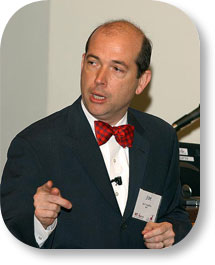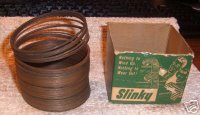 Here's a speech I liked hearing about - reported in Advertising Age by Lisa Sanders and from the mouth of Euro RSCG Worldwide's David Jones:
Here's a speech I liked hearing about - reported in Advertising Age by Lisa Sanders and from the mouth of Euro RSCG Worldwide's David Jones:No argument from me. I love it.Taking a "swipe at the research and pre-testing industry," Mr. Jones next exhorted listeners to stop asking permission. Drawing on a "truth" from British comedian Vic Reeves that "96.2% of all statistics are made up," Mr. Jones -- also a Brit -- argued that some of the most well-liked ads aren't based on research or focus-group results. Instead they rely on a creative director's gut instinct of what consumers will like. He cited Procter and Gamble's effort for Charmin toilet tissue created by Euro rival Publicis Worldwide that riffs off of the many euphemisms for elimination. "Publicis took a risk, and did it without a bit of research," he said.
And by way of reinforcing the previous point, his last bit of advice was for creatives to "trust your gut." Advertising is changing fast, and to not take a risk is risky -- even though it's scary to take a risk.
But there is one big problem. When targeting Baby Boomers you have to have the right guts around to trust. That'd be 50+ creative guts.
It wouldn't be too bright to trust my gut to come up with a campaign for a product aimed at twentysomethings. My gut would tell me, "… Ummm ... ummm ... Wait! I got it! We get some twentysomething girl an' spike her hair an' give'er tattoos and a nose ring an' put an iPod on her head an' bed some hip-hop music an' have her hold up the toothpaste! Yeah! They'll buy it! They'll buy it!"
Sixties music. Peace signs. They'll buy it. Portraying Boomers as teenagers with gray hair. They'll buy it.
Actually, I'm talking about diversity and playing the odds.
Also in the piece are incisive comments by Mr. Jones about the problems of relying on WOM and the premature death knell for the 30-second spot.
And check out other videos from the conference. I especially liked the ones with David Verklin and Alex Bogusky. Much of what they say parallels a few chapters in my book:
Verklin: More video/commercial content needed, and targeted.
Bogusky: Working with a client.










